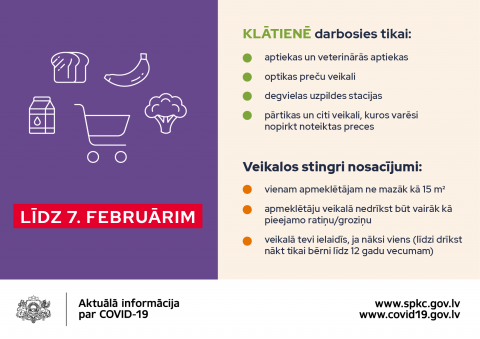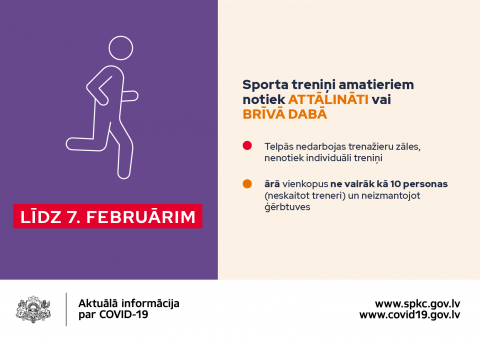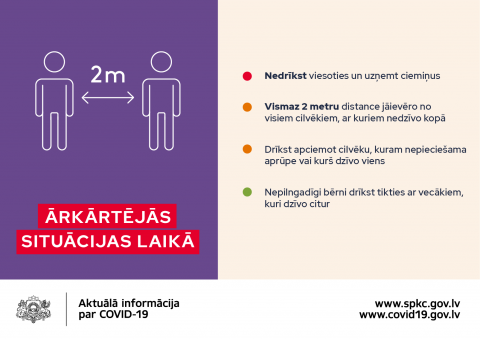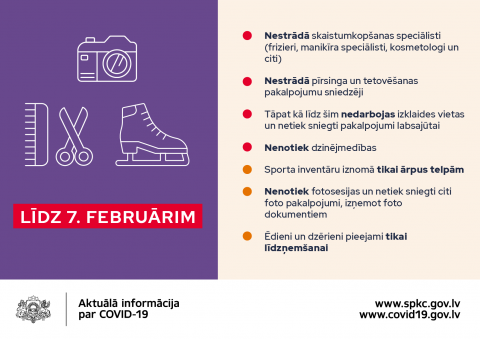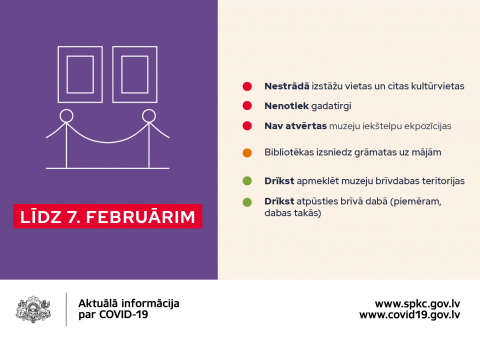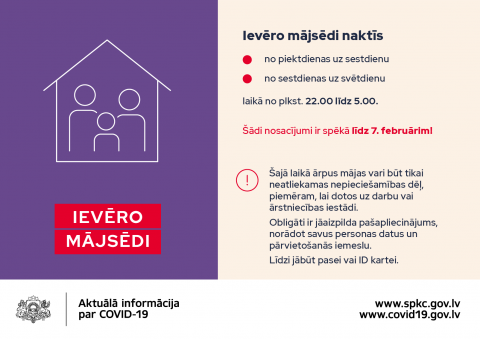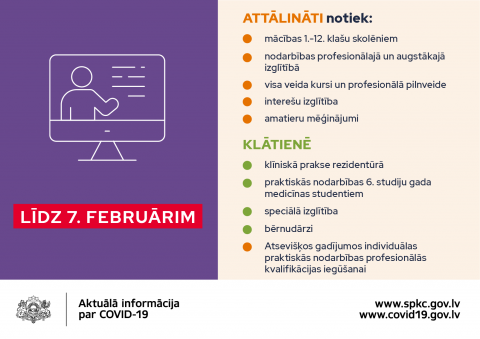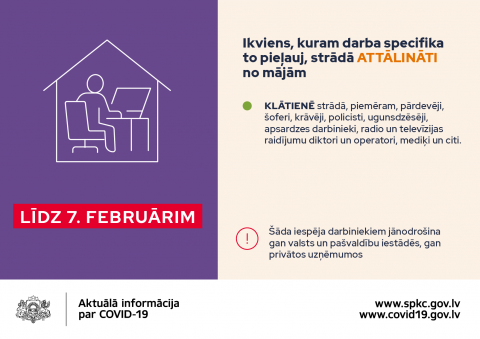Safety measures for limiting Covid-19 have been extended until 7 February
Last update 22.01.2021
The epidemiological situation in Latvia is stabilising slowly; however, it is not yet possible to abolish or relax the established safety measures. Data from the Centre for Disease Prevention and Control show that the Covid-19 virus is continuing to spread in Latvia and that the situation is still critical, despite the improvements of recent days.
In order to start talking about relaxing the safety measures, the epidemiological situation must still improve considerably. The earliest opportunity to talk about the gradual relaxation of restrictions will arise when no more than 200 new cases per 100,000 inhabitants are registered over a period of 14 days.
Today, on 21 January, the government decided to make amendments to Cabinet of Ministers Order No. 655 “Regarding Declaration of the Emergency Situation”, extending the current safety measures until 7 February.
The government also decided that as of 25 January, pupils in years 1-4 will study remotely like the rest of the students in the country. A decision has also been made with regard to certain situations when individual practical classes for obtaining a qualification may take place in person. This will be possible if the acquisition of a qualification requires practical classes in person, which cannot be obtained remotely, for example, in construction, mechanical engineering, metalworking, wood industry, energy industry, etc. This will only be possible in cases where a two-metre distance can be observed between people during the acquisition of skills.
What safety measures will remain in place until 7 February in order to reduce the number of possible contacts?
In education:
- Pupils in years 1-12 will study remotely.
- Clinical internships for residency students, and practical classes for year 6 medical students in order to provide support to hospitals, may take place in person.
- Special educational institutions and nurseries will operate in person.
- Other practical classes (also individual) will only be possible remotely. In professional and higher education, various courses, etc., classes may only take place remotely (with the exception of individual practical classes for obtaining a professional qualification in certain cases).
- Interest-related education and various rehearsals may only take place remotely.
In sports:
- As before, amateur sports training will only be allowed outdoors (up to 10 people without the use of changing rooms). This means that sports clubs will not accept clients indoors - gyms will not work, and people will not be able to go to the club to train individually.
In culture:
- Exhibition sites and other cultural venues will not be working, and it will not be allowed to organise any fairs.
- Libraries will be allowed to lend books.
- Indoor premises of museums will be closed for visitors; however, the open-air areas of museums will continue to operate, subject to ensuring the one-way movement of people, preventing collisions of human flows, and ensuring a distance of at least 2 metres between people. Nature trails will also be allowed to operate under such conditions.
Services:
- The entire beauty industry (including hairdressers) will not be working.
- Sports equipment rental services may only be provided outdoors.
- Photo shoots and photo services will not take place, other than for document photos.
- There will be no drive hunting.
In sales:
The current trade regime will be extended until 7 February. Subsequently, until 7 February only the following types of points of sale will be open:
- pharmacies (including veterinary pharmacies);
- optical goods stores;
- fuel stations;
- points of sale where the following groups of goods may be sold:
- groceries;
- hygiene products;
- essential household goods;
- mobile phone prepaid cards;
- tobacco products, herbal smoking products, electronic smoking devices and their liquids;
- animal feed and goods;
- press publications;
- public transport tickets;
- mouth and nose coverings and individual protective equipment;
- artisanal agricultural products;
- flowers.
Detailed information on trade is available on the website of the Ministry of Economics.
Please note that the online sale of goods is not restricted.
At work:
- As before, anyone who can work remotely from home must do so. It is the employer's responsibility to provide this option. These conditions apply to both public administration and local government institutions, as well as private companies. This means that salespeople, drivers, stackers, police officers, firefighters, security guards, radio and television announcers and operators, doctors, and others, but not, for example, office workers, will work in person.
Curfew:
- Until 7 February, a curfew from 22.00 until 5.00 must be observed on the nights from Friday to Saturday and from Saturday to Sunday. During these hours, people may only be out of their household for urgent reasons, such as going to work or a medical institution. It is mandatory to fill in the self-certification form, indicating your personal data and the reason for your movement. You must have a passport or an ID card with you.
The full text of the order will be publicly available after its publication in the official gazette “Latvijas Vēstnesis”.
